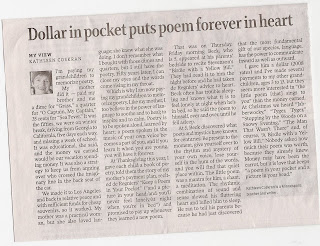
His Nana's guest editorial was published in the West Metro section of the Star Tribune today. Beck is a central figure in her article. We'll probably be reading the article at bedtime tonight instead of memorizing any new poetry (sorry Nana!)
Word Cloud courtesy of http://www.wordle.net/
I’m paying my grandchildren to memorize poetry. My mother did it, paid my brother and me a dime for “Grass,” a quarter for “O Captain, My Captain,” thirty-five cents for “Sea Fever.” It was the fifties, we were on winter break, driving from Georgia to California, five days each way, and missing a week of school. It was educational she said and the money we earned would be our vacation spending money. It was also a strategy to keep us from arguing over who crossed the imaginary line in the back seat of the car. We made it to Los Angeles and back in relative peace and with sufficient funds for cheap souvenirs, so it worked. My mother was a practical woman, but she also loved language; she knew what she was doing. I don’t remember what I bought with those dimes and quarters, but I still have the poetry. Fifty years later, I can close my eyes and the words come rising in my throat.
Which is why I am now paying my grandchildren to memorize poetry. Like my mother, I too believe in the power of language to soothe and to heal; to inspire and to calm. Poetry is to be spoken aloud, learned by heart; a poem spoken in the music of your own voice becomes a part of you, and if you learn it when you are young, you will have it forever.
At Thanksgiving this year, I gave each child a book of poetry, told them the story of my mother’s payment plan, recited de Regniers’ “Keep a Poem in Your Pocket” (“…and a picture in your head/and you’ll never feel lonely/at night when you’re in bed”) and promised to pay up whenever they learned a new poem.
That was on Thursday. Friday morning Beck who is 5 appeared at his parents’ bedside to recite Stevenson’s “Birdie with a Yellow Bill.” They had read it to him the night before and he had taken de Regniers’ advice to heart. Beck often has trouble sleeping and knows what it is to feel lonely at night when he’s in bed, so he said the poem to himself, over and over, until he fell asleep.
At 5 Beck discovered what poets and mystics have known for centuries: be present to the moment, give yourself over to the rhythm and mystery of your own voice, lose yourself in the hum of the words, and you will find that quiet place within. The little poem was a mantra for him, a chant, a meditation. The rhythmic combination of sound and sense slowed his fluttering heart and lulled him to sleep. He ran to tell his parents because he had just discovered that the most fundamental gift of our species, language, has the power to communicate inwards as well as outwards.
I gave him a dollar (2008 rates) and I’ve made several payments to my other grandchildren, ages 3 to 13, but they seem more interested in “the little poem [that] sings to you” than the money earned. At Christmas we heard “Jabberwocky, “ “Tyger, Tyger,” “Stopping by the Woods on a Snowy Evening,” The Man That Wasn’t There” and, of course, “A Birdie with a Yellow Bill.” Nobody asked how much their poem was worth, because they already knew. Money may have been the carrot, but it is love that keeps “a poem in your pocket and a picture in your head.”






No comments:
Post a Comment